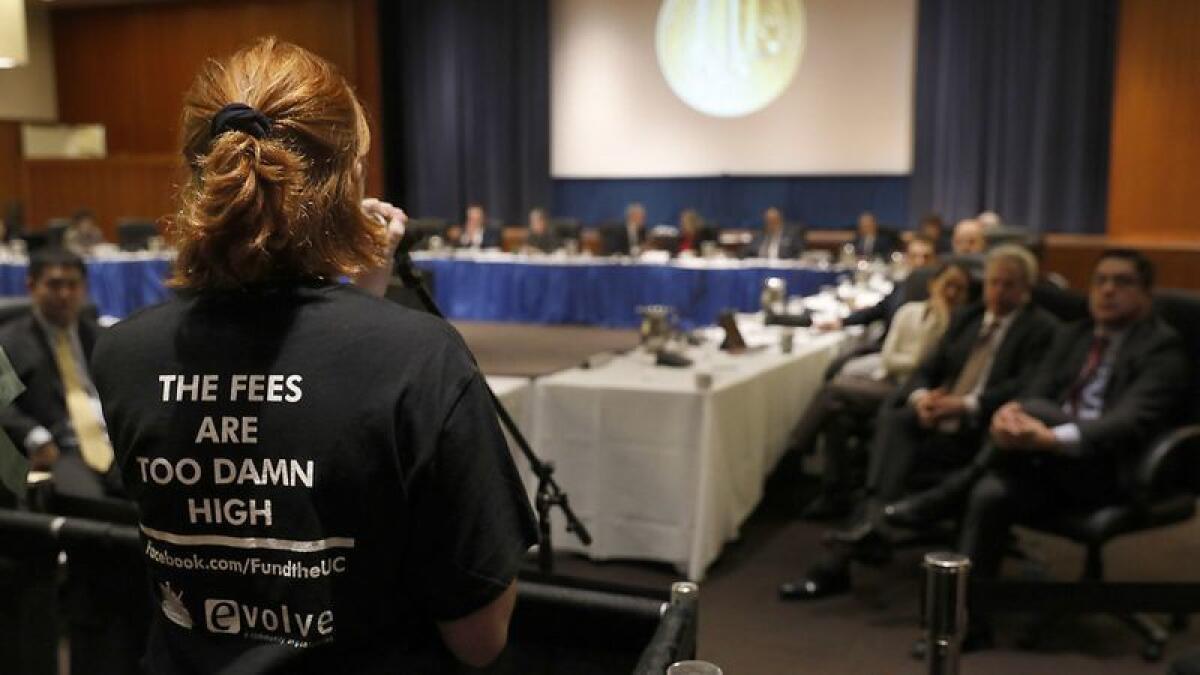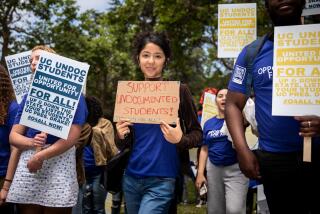UC regents hold off on raising nonresident tuition after some protest

The University of California backed away Thursday from a tuition increase for students from other states and countries after several regents expressed concern that it could limit diversity and hurt some immigrants.
UC President Janet Napolitano had recommended increasing nonresident tuition by 2.6%, from $28,992 this year to $29,754 in the fall. Students from outside California pay this supplemental tuition on top of the base UC tuition of $12,570.
Napolitano announced this month that UC would not raise tuition for California students.
She told regents that the $30 million raised by an increase for nonresident students would help campuses enroll more Californians, increase financial aid and hire faculty, staff and teaching assistants.
But members of the UC Student Assn. organized against the proposal, saying their peers from outside California have been scapegoated and made to bear an unfair financial burden. Several regents amplified those arguments Thursday.
“We need to stop treating them as cash cows,” Regent Michael Cohen said of nonresident students.
Regent Hadi Makarechian noted that the strong dollar had devalued many foreign currencies, effectively doubling the cost of education for students from some countries, including Mexico, Brazil and Egypt. Shutting them out would reduce opportunities for California students to make connections with people around the world, some argued.
Others said that raising costs would hurt some local students, including those without legal immigration status who don’t meet the qualifications for in-state tuition.
Regent John A. Perez said an added problem was UC’s inability to offer financial aid to nonresident students. As a result, some regents said, UC was moving toward limiting seats to more affluent students.
“That goes against the nature of everything we do,” said Regent Eloy Ortiz Oakley.
UC regents already had approved a $9.3-billion budget in November that included higher fees for nonresidents.
Ultimately, regents voted to hold off on a tuition increase and come up with other ideas to plug in the hole that not raising the tuition will create. Several said they would try to lobby for additional funding in Sacramento even after Napolitano told them that UC efforts to do so had been turned down. Some legislators — and a critical state audit — have blamed nonresidents for taking spots at Californians’ expense and pressured the UC system to limit their numbers.
Makarechian, a real estate executive, said each campus could save $100 million by squeezing its contractors to reduce construction costs. Others pledged to help raise money.
Pérez and Student Regent Devon Graves advocated for multiyear tuition plans so students and their families would know exactly how much a UC education would cost them over time.
In the end, Napolitano bowed to the chorus of concerns even as she told regents that the shortfall would affect UC’s renowned quality.
“I know how to get out of the way of the train,” she said.
Twitter: @TeresaWatanabe
More to Read
Sign up for Essential California
The most important California stories and recommendations in your inbox every morning.
You may occasionally receive promotional content from the Los Angeles Times.











